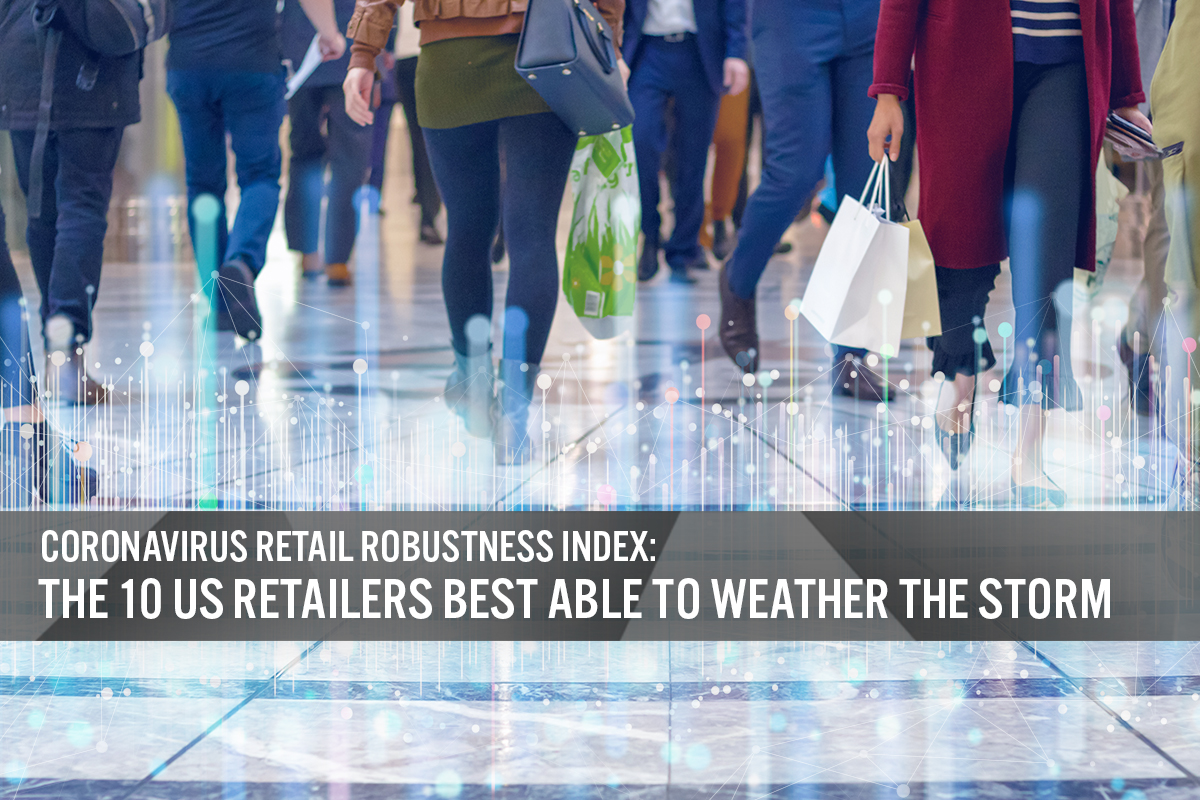
albert Chan
This report presents Coresight Research’s new Coronavirus Retail Robustness Index, which evaluates the 100 largest US retailers (by revenue) on their ability to weather the dramatic demand shifts we are seeing as the ongoing coronavirus outbreak worsens in the US.
We evaluate retailers based on financial strength; whether they sell products offline, online and internationally; and, on the length of tenure of the CEO.
These are the 10 retailers that rank highest in our index:
Figure 1. Coresight Research Coronavirus Retail Robustness Index: Top 10 Retailers [wpdatatable id=102] Source: Company reports/Coresight ResearchAnalysis Methodology
The Coresight Research Coronavirus Retail Robustness Index evaluates the 100 largest US retailers (by revenue) based on their ability to weather the current shifts in demand during the coronavirus outbreak.This is how we calculated it (with the % weighting in parentheses):
- Retailer financial health (20%): Represents a retailer’s financial state and ability to handle financial challenges, including the coronavirus outbreak. Commentary: Retailers with a strong financial position and/or relatively high stock valuations should be better able to withstand the current environment. Several retailers, including L Brands, Nordstrom, Macy’s, Ross Stores and Ulta Beauty, have recently suspended share repurchase programs and/or drawn on credit facilities to buttress cash positions to withstand the decline in demand. These credit-line drawdowns do not change our calculations, because they are neutral to the working capital input.
- International exposure (15%): Reflects the percentage of revenues generated internationally versus in North America. Commentary: With different geographies confronting different levels of disruption from the outbreak, companies with international exposure should have more supply-chain options and less exposure to the North American market.
- Offline-online availability (25%): Represents a retailer’s ability to sell products offline and online (i.e., its stores are open). Commentary: Many retailers have announced temporary store closures. E-tailers such as Amazon and Wayfair are still able to sell products online, whereas pure brick-and-mortar retailers have limited opportunities to generate sales. Still, Amazon’s Whole Foods Markets remain open (as it sells essential products), while other retailers such as Best Buy and Dick’s Sporting Goods are using innovative solutions such as enhanced curbside pickup.
- Product mix (20%): Determines the relative benefit of a retailer’s product categories. Commentary: Retailers such as Target, Walmart and others offering staples and health and wellness products (which remain open) should see steady revenues, though the product mix is currently highly skewed towards staples. For example, Target reported month-to-date through March 25 comparable sales of essentials and food & beverage were up 50% year over year, while comparable sales of apparel and accessories were down 20%.
- Management tenure (20%): Reflects the number of years the CEO has served in the position. Commentary: CEOs who have occupied their positions for longer should be better acquainted with the company and better equipped to navigate the current environment.
- The index is a model for retailer robustness and as such relies on certain assumptions and estimates.
- The environment is evolving dramatically on a daily basis: figures are thought to be accurate as of writing but may change as reported financial figures generally precede the recent spate of temporary store closures.
- The index is not a predictor of retailer future financial health.